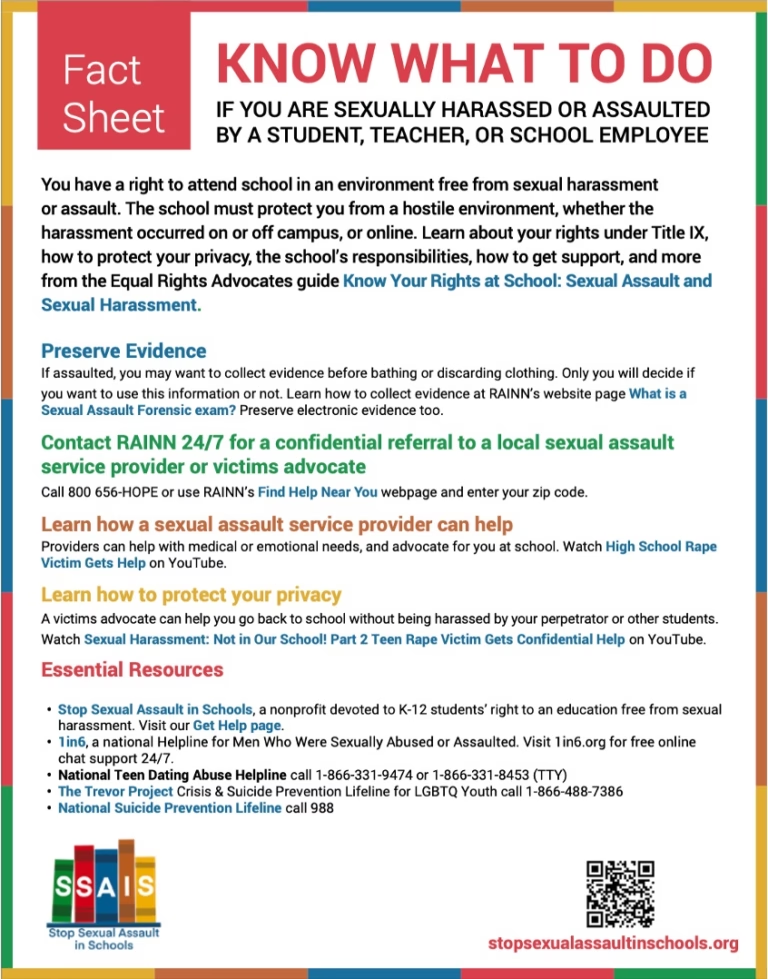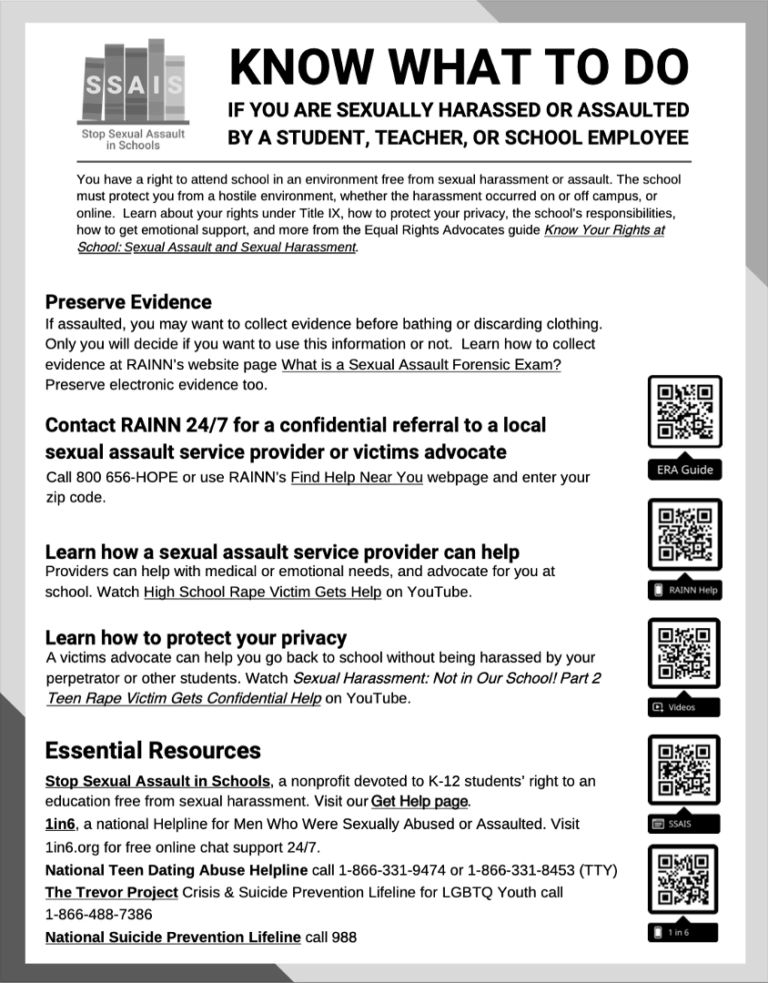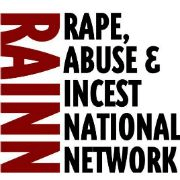Resources for Coping with Sexual Harassment/Assault and Reporting
Confusion abounds. Students and families across the country struggle with the devastating impact of sexual harassment and sexual violence. Yet in many cases, victims don’t even acknowledge that they’ve been sexually harassed/assaulted. That’s because victims have come to accept sexual harassment as normal and sexual assault as their fault.
In addition, school districts use their considerable power to shut down complaints to avoid being sued after they failed to respond appropriately to reported sexual harassment/assault. Schools typically deny the assault, blame the victim, and frustrate the damaged student, hoping she/he will go away. Whether the harassment/assault occurred at school, on the Internet, or in another location, schools must comply with Title IX, a federal civil rights law guaranteeing every student an equal education free of sexual harassment and gender discrimination.
Shock follows. Parents of victims are shocked when they learn how school districts put liability and reputation ahead of students’ well-being. Families are confused and feel powerless when the district denies the harassment/assault. Review these definitions of sexual harassment/assault, get support from the resources below, learn how to file a complaint, and become an empowered agent for change!
Do you know what to do? This fact sheet will inform you about your rights under Title IX, how to protect your privacy, the school’s responsibilities, how to get emotional support, and more.
Why and How to Report
- Keep good documentation.
- Follow up phone conversations with an email or written summary to those involved (schools, medical providers, law enforcement, etc.).
- Use written communication whenever you can.
- Keep all medical reports, records, and paperwork from any office or person connected with your complaint.
- Keep a detailed written record of the harassment.
- Record what happened, when, where, who else was present, and how you reacted.
- Save any notes, pictures, or other documents you receive from the harasser.
- Take screenshots/print out information showing retaliation against the victim.
What to Do Immediately if Assaulted
- Get away from the attacker to a safe place as fast as you can. Then call 911 or the police.
- Call a friend or family member you trust. You also can call a crisis center or a hotline to talk with a counselor. One hotline is RAINN’s National Sexual Assault Hotline at 800-656-HOPE (4673). Feelings of shame, guilt, fear, and shock are normal. It is important to get counseling from a trusted professional.
- Do not wash, comb, or clean any part of your body. Do not change clothes if possible, so the hospital nurse can collect evidence. Do not touch or change anything at the scene of the assault. It is important to collect evidence, even if you don’t believe you will prosecute the assailant.
- Go to your nearest hospital emergency room as soon as possible. You need to be examined, treated for any injuries, and checked for possible sexually transmitted infections (STIs) or pregnancy. The nurse or doctor will collect evidence the attacker may have left behind.
- Collect the evidence even if you are unsure whether you will file a complaint.
- While at the hospital:
- Ask the hospital staff to connect you with the local rape crisis center. Many times a crisis center can support you while in the hospital, help you make choices about reporting the attack, and help you find counseling and support groups.
- If you decide to file a police report, you or the hospital staff can call the police from the emergency room.
- Get yourself to a safe place.
- If you intend on filing an official police report, or if you might want to in the future, RAINN recommends for the purposes of evidence collection that you:
- Do not shower
- Do not use the restroom
- Do not change or dispose of clothes worn when the assault occurred
- Do not comb your hair
- Do not clean up the crime scene
- Do not move anything the offender may have touched
- Consider seeking medical attention.
- Talk to someone you trust.
- Decide if you want to report the assault to your school and/or the police.
- Decide if you may want or need legal protection from the perpetrator.
- Consider seeing a counselor.
- Create a safety plan.
- Follow a routine that includes things that make you feel good.
- Again the most important thing is to trust your instincts.
National Crisis Hotlines
Call One or More of These National Crisis Hotlines to connect you with a resource in your area. [For persons of all gender identities and orientations]:
- RAINN National Sexual Assault Hotline: 1-800-656-HOPE
- National Teen Dating Abuse Hotline: 1-866-331-9474
- National Domestic Violence Hotline: 1-800-799-SAFE
- Love Is Respect: 1-866-331-9474
- 988 Lifeline
- Joyful Heart Foundation Resources, Hotlines, and Information
- Childhelp.org National Child Abuse Hotline 1.800.422.4453 Resources for children, parents, and teachers
Organizations that Provide Reliable Resources/Information
- Victim Rights Law Center resource library
- Equal Rights Advocates sexual assault and harassment at school
- The Rape, Abuse & Incest National Network (RAINN) and its National Sexual Assault Hotline 1-800-656-HOPE (4673), the largest anti-sexual violence organization in the U.S. Its National Sexual Assault Hotline is a partnership of more than 1,100 rape treatment hotlines across the country, providing victims of sexual violence with free, confidential services 24/7. RAINN also offers tips for staying safe on campus and reporting.
- National Teen Dating Abuse Helpline connected with Loveisrespect.org 1-866-331-9474 | TTY 1-800-331-8453 | text “loveis” to 77054 The National Teen Dating Abuse Helpline offers phone, text and chat services targeted at young people involved in abusive relationships. It also offers resources for concerned friends, parents, teachers, clergy, law enforcement and service providers.
- The Joyful Heart Foundation’s advice for survivors. 1-800-273-TALK (8255). The Foundation’s mission is to heal, educate and empower survivors of sexual assault, domestic violence and child abuse.
- 1is2Many. Resources from The Obama White House.
- After Silence online support group | After Silence en Español AfterSilence.org offers moderated online support groups, a message board and a chat room service where survivors can connect, share stories, ask questions and work on healing and recovery.
- Know the laws in your state (from RAINN).
- Legal Resource Kit Sexual Harassment in the Schools (Legal Momentum).
If Someone You Know is Contemplating Suicide
- 988 lifeline Call 988
- Your Life Your Voice 800-448-3000
- The Trevor Project for LGBTQ 866-488-7386
- Teen Line 310-855-4673
- Reachout.com 1-800 448-3000
- Lifeline Crisis Chat
- BeFrienders Worldwide (multi-lingual)
- Yellow Ribbon 303-429-3530
- National Institute of Mental Health prevention, facts, research, resources
Selected Prevention, Healthy Relationships, Consent and Essential Resources
- Love is Respect, a comprehensive site for teens
- Signs of dating violence for teens from Voices Against Violence
- Take Action Against Abuse–For Parents from the US White House, including recognizing abuse, talking with your teen, role of technology, and questions for schools
- What not to say to a victim of sexual assault from ACASA Arkansas video
- Warning signs of abuse from US White House, with helpful links to date rape and relationship safety
- Not Alone, Official Resources from the US Government
- Essential Information on Sexual Assault from RAINN, a national resource
- Reducing Your Risk of Sexual Assault from RAINN
- How Can I Lower My Risk of Sexual Assault and resources from Women’s Health.gov
Resources for Male Survivors and Perpetrators of Sexual Harassment and Assault
Resources for LGBTQI+
- Helplines and resources from GLSEN
- Helpline and resources at the Trevor Project (866-488-7386)
- LGBTQ resources from Notalone.gov
- National Coalition of Anti-Violence Programs LGBTQ
Resources for Sexual Assault Hazing
Is there a resource you’d like to see here? Contact us.






